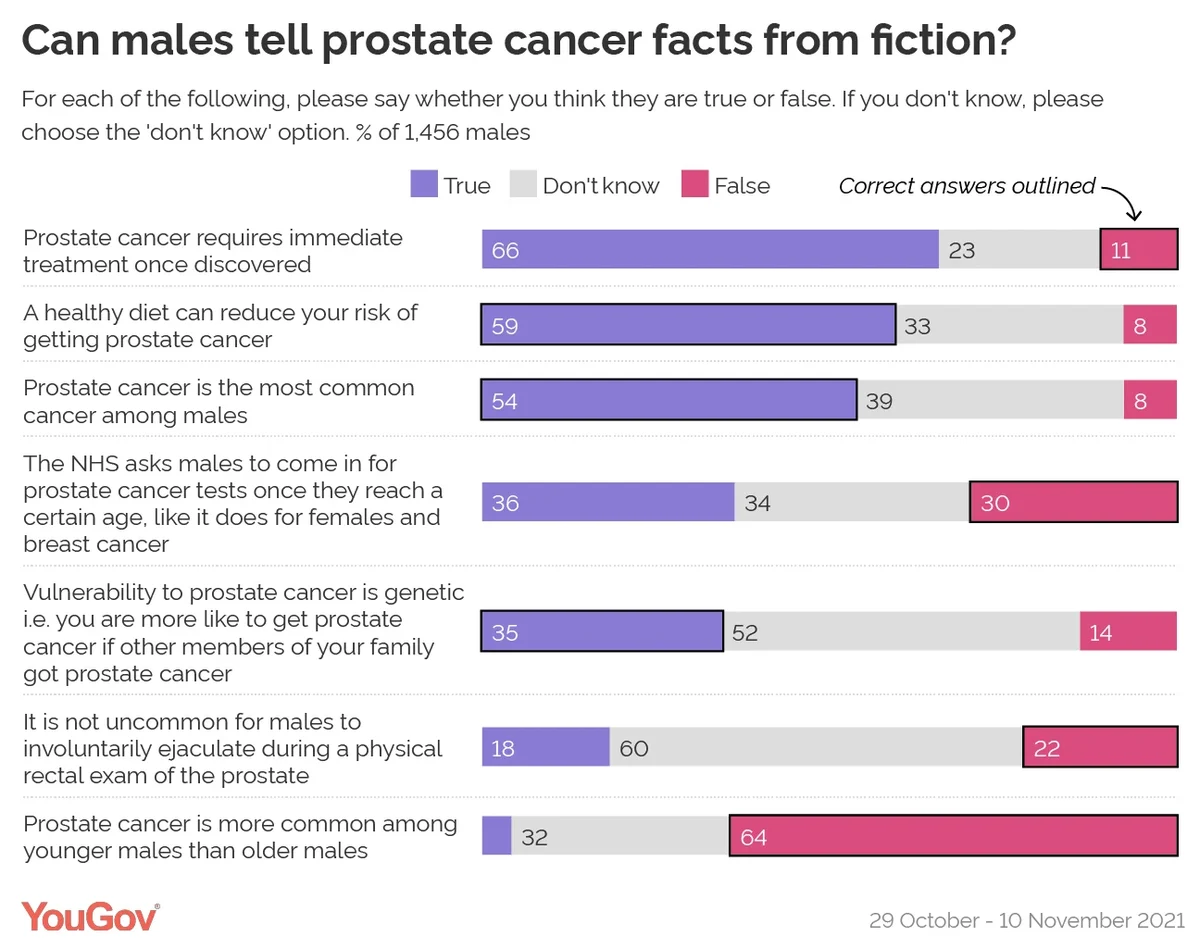Most are, however, willing to take routine tests
November marks the annual sprouting of facial hair for the ‘Movember’ campaign, which sees men grow moustaches to raise awareness and funds for male health issues, most notably prostate cancer.
Prostate cancer is the most common cancer among males in the UK, with more than 47,500 diagnoses and 11,500 deaths from the disease each year.
But do males know what the signs of the disease are? A new YouGov survey asked 1,456 Britons assigned male at birth to list (in their own words) all of the symptoms for prostate cancer that they are aware of.
The NHS website lists the following as prostate cancer symptoms:
- needing to pee more frequently, often during the night
- needing to rush to the toilet
- difficulty in starting to pee (hesitancy)
- straining or taking a long time while peeing
- weak flow
- feeling that your bladder has not emptied fully
- blood in urine or blood in semen
with bone and back pain, a loss of appetite, testicular pain and unintentional weight loss given as signs that the cancer may have spread.
But when asked, two thirds of males (68%) said they didn’t know any symptoms of prostate cancer. This falls somewhat among older males, but remains very high: 62% of 50-59 year old males don’t know any symptoms of prostate cancer, nor do 60% of 60-69 year olds and 54% of 70-79 year olds.
The most recognised symptom is having to – or feeling the need to – urinate more frequently (although as the NHS is keen to stress, it could also be symptomatic of other ailments). One in eight males (13%) included this symptom in their answer.
The second most-recognised symptom is difficulty urinating, which 10% of males said, and blood in the urine was recognised as a sign by 6%. Fewer still cited any of the other symptoms.
One in five untested males aren’t willing to go for a routine prostate check
Prostate issues generally arise with age, and this is reflected in the figures on how many males have had a prostate exam.
Overall, 20% of males report have had a check, rising to 28% among those in the 50s, 35% of those in their 60s and 52% of those in their 70s.
Among those who have not previously been tested, willingness to go for a routine check is high – 72% say they are “very” or “fairly” willing to have a routine test for prostate cancer. Nevertheless, one in five (18%) say they are “not very” or “not at all” willing to take such a test, including 6% who gave the more emphatic no.
But while males are largely willing to take a prostate exam, the results do show that awareness that it involves a doctor inserting a finger into the rectum does diminish this willingness slightly.
One in five of those who know that a rectal exam is typical procedure (22%) express an unwillingness to get their prostate checked out – although only 6% describe themselves as “not willing at all”.
This is lower than the 10% of those who think a typical exam only involves a blood test who expressed unwillingness, and 13% of those who thought both forms were typical.
Likewise, far fewer males say they are “very” willing to take a routine prostate test if they know it typically involves a digital insertion – 31%, compared to 48% who think it only involves a blood test and 43% who think it can involve either.
Can males tell prostate cancer facts from fiction?
Males are most likely to know that prostate cancer is not more common among younger males than older males. Almost two thirds correctly identified that this is the case (64%).
Most males are also aware that a healthy diet can reduce risks of prostate cancer (59%) and that prostate cancer is the most common cancer among males.
However, there are some key knowledge gaps. Just one in three males (35%) knew that vulnerability to prostate cancer is genetic, with people standing a greater chance of getting it if male relatives have done so.

Similarly, just 30% are aware there is no NHS prostate cancer screening program once males reach a certain age in the same way that there is one for females and breast cancer.
And just 11% know that prostate cancer does not necessarily require immediate treatment once discovered. In fact, if caught at early stages the NHS notes that doctors may recommend ‘active surveillance’ to monitor the condition rather than treatment, as the potential side effects of treatment may outweigh the risks. This is the answer that males are most likely to actively get wrong (66% did so), rather than simply answering “don’t know”.
Only one in five (22%) are also aware that ejaculating during prostate exams is just an urban legend, with a similar number convinced that it is true (18%).










